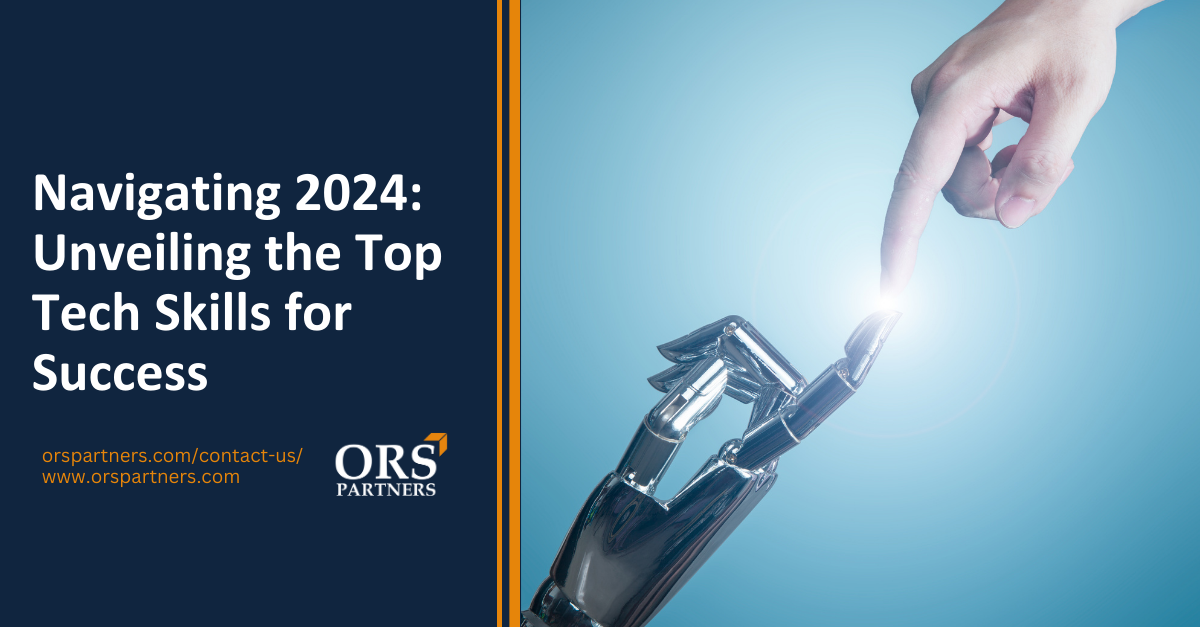
19 Jan Striking a Balance in 2024: AI’s Impact on Time, Data, and Performance, All While Valuing Human Collaboration
In our previous blog, we discussed the growing demand for technology professionals who have the ability to integrate AI and ML technology across all industries. This trend will continue, and AI technology will become an increasingly important part of how we work in 2024. Recruiters will have better data and new tools for sourcing and screening available to them, enabling them to advise leadership regarding talent strategies and trends with a level of confidence and depth that was previously reserved for firms with large research teams.
Projections for 2024 point to headcount growth at a reasonable and steady level across most industries, with significant growth in Healthcare and Hospitality, along with growth in technologies that support the growth of generative AI. Concurrently, AI will allow employees to reduce the amount of time spent on tasks such as reporting and scheduling, which is driving a ‘do more with fewer staff’ philosophy by employers. The confluence of these events will create more pressure on staff at all levels to take a data-driven and strategic approach to their work, and talent acquisition is no exception.
“87% of CHROs say they’re evaluating new ways to deliver HR value at a lower cost — with a greater focus on the employee experience and generative AI (GenAI)” (PwC CHRO Pulse Survey, August 2023)
When talking about talent acquisition and management in 2024, the use of AI tools will have an impact across all areas:
Balanced Employer/Employee Relationship
Mutual respect and shared reward define the modern employer-employee relationship. In a tight labor market with stable wages, employees will require personalized benefits and relevant skill-building opportunities. Proactive collaboration, where leadership engages directly with employees to co-create a culture of dynamic growth and recognition, is the key to this new balance, driving success for both individuals and organizations. AI tools will support skill-building and enable leaders to personalize benefits. These tools will also facilitate rapid response to the needs of individual employees.
“90% of CHROs say they’re tailoring benefit and development programs for different types of workers” (PwC CHRO Pulse Survey, August 2023)
Beyond Résumés: The Rise of Skills-Based Hiring in a Changing Workforce
Skills-based hiring demands personalized position descriptions focused on skills and work experiences instead of title or education. This approach has been proven to attract diverse, qualified candidates, ensuring the right fit from the start. Instead of looking for a Director of HR, leaders will begin to specify that they are looking for “an HR leader who has scaled a company from 10-100 people and implemented a new HRIS system.” The title will be less relevant than the work performed.
Recruiters are redefining sourcing by leveraging their experience and new technology tools to assess skills and mindset, not just credentials, before candidates apply. AI-powered screening tools, continually trained to focus on relevant skills and experiences, are helping eliminate bias throughout the process, ensuring a level playing field.
By prioritizing skills, companies unlock a broader talent pool, build stronger teams, and drive true diversity. This isn’t just the best-in-class approach to hiring – it’s the only way forward to build tomorrow’s workforce.
“We’ve got great research from our colleagues at the McKinsey Global Institute that looks at what is coming in terms of skill shortages in the US. There is going to be a huge number of jobs in the skilled economy that we’re going to need to find people for. And if you build onto that what we need in healthcare, and we build onto that continued need for technology and other work, we’re seeing all of these folks in skilled areas where there are shortages. I think our clients are seeing the need to widen the aperture of who they’re hiring just because it’s tight now and it’s going to be tight for a number of these roles in the future.” (Bryan Hancock, McKinsey Talks Talent October 25, 2023)
Long-term Relationships
Cultivating professional networks and forging long-term bonds with individual candidates over the years is becoming the industry standard. Advanced platforms will fuel this shift, streamlining relationship management and personalizing communication at every touchpoint. This proactive approach builds a vibrant, pre-vetted talent pipeline, ensuring you attract top performers long before they begin to look for a new opportunity.
Recruitment Branding Matters
A strong recruitment brand stands out by showcasing your company’s culture, values, and mission. AI-powered tools like chatbots and personalized outreach have moved beyond sales and service for customers and have moved into guiding candidates through the recruitment process and helping to build long-term connections with potential candidates.
A company’s reputation on sites like Glassdoor will continue to be critical as candidates utilize AI tools to research potential employers. Share your company’s story, showcase employee experiences, and foster a genuine dialogue across all social media platforms.
Consultants Are Still Needed
While AI automates processes, the human touch remains the lifeblood of successful recruitment. Experienced consultants build genuine connections, foster trust, and demonstrate empathy throughout the candidate journey. This ensures a seamless and positive experience for both your organization and potential hires, maximizing candidate acceptance rates and employee retention. In a world where technology plays an increasingly important role, the human touch becomes even more crucial in building sustainable, balanced relationships with your workforce.
As a leader in talent acquisition, ORS has implemented many of these tools and practices internally, and we are actively supporting clients in their efforts to evolve their talent strategies. Together, we’ll navigate the changing landscape, attract the best talent, and build a resilient, future-proof workforce, embracing a more balanced and fulfilling reality for both employer and employee.


